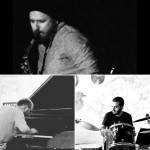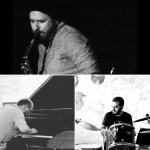freejazz freeimprovisation jazz noise electric avant-garde's Articles
We interviewed Ondrey Zintaer, leader of the ZTB trio (Zintaer,Tognola,Bøtøx), an European ensemble that is establishing itself in the musical avant-garde scene.
1. Ondrey, you lead one of the most interesting trios in the European avant-garde area, so the first question I’d like to ask you is: radical choice as pure artistic expression, need of exploration, or both?
I think it is both but maybe much more than this. But I little feel that the most precise answer is that I don’t know. And this is also what I love about all around it. The feeling that is extremely hard to cover by words. Our trio exists mainly in the cyberspace. Hence our musical communication is not in form of dialogues but much more in form of letter writings where always one of us prepare a recording of his instrument a a stratum of resulted composition. The resonance between each layers are always fascinating. The moment of surprise after mixing and equalising is amazingly addictive.
2. Listening to your trio’s discography, you can notice a maturation both in contents and in language and, above all, an ever more skilful use of electronics, is the ZTB always on the move?
Yes of course ZTB is alive. And I hope will long live and prosper. We had our first birthday in these days and I think out first year was really intensive and creative. Hence I think we found out our visions and also borders. We tried what and how we can do together. All of us enjoyed to be a part of ZTB. Yes, electronic is something like in the middle of our collective creation. These days after releasing three great albums ZTB – Organ, Zintaer and Kiyasu – BRAIN and my solo album Zintaer – anthroportrait. Hence I feel little bit tired but full of new emotions and visions.
3. The first works had a totally improvised approach, in the last ones, however, also the composition begins to have an important role and it manifests itself in the mix between acoustics and electronics, do you think this is the way for your trio?
I love the improvisations with Paolo and Filippo but somehow very concretely feel the need of move to some higher complicated form of music. I don’t think the music should be complicated, but the process of creation should be. Pure improvisation should be more the tool than the result of ZTB. Album Spiritus Mundi was the great example. The album was more composed than the result of pure coincidence.
4. Looking through your discography, except for Spiritus Mundi, still without a label, it goes from Breath, produced by the Polish label Antenna Non Grata, to Organ, published by the German label Sickhead and Fear of War, distributed by Right Brain Records, Seattle . It is undeniable that the record companies in the sector believe in your project, what do you think is new for the ZTB? How do you place yourself in the discographic panorama’s proposals related to freejazz, free improvisation and avant-garde music in general?
Spiritus Mundi (I hope) would be as it is promised released on Imploding Sound records also from Seattle as digital and cassette tape release. All previously mentioned releases are just digital. The most successful for me is support of Right Brain records. The label is closest to the freejazz area. I think our first steps are nice. It is too early to have some nice label that would produce CDs or vinyls and cover all distributions and PR and whatever is needed. Almost everything I released as solo artist I did it alone under my control and I have to say that was also very nice to prepare all my tapes at home, print all cover j-cards in my office and sell and send everything one by one. Yes it was really time, energy and money consuming but beautiful. Hence I would also like to prepare physical releases of our albums Breath and Organ somehow by myself. We will see. It is not easy. Tapes of ZTB – Fear of War are sold out now and almost all obtained money was sent to help Ukraine. It was not big amount of money but pretty enough when you imagine that were made from beautiful music. I’m not completely sure if I answered your question.
5. Breath contains your performance at the ImproFest, much appreciated by the audience of the event and is made of two totally improvised suites, here the free matrix of the sixties and seventies is very present, the performances of Don Cherry by Cecil Taylor, Ornette Coleman, etc. How important is this tradition in your artistic conception?
Yes Of course they are extremely important when you mentioned such famous names then also Albert Ayler, Anthony Braxton, Roscoe Mitchell etc. They are very important as something like a proof that to produce such music (for not very accustomed audience) is maybe not normal but not weird. I feel enormous respect for such pioneers for their liberation process. To be honest I’m not expert of their discography. I know some of their albums and also some younger artists. The process of my creation is very dreamy and very surreal. It is good to be inspired but maybe better word is to by motivated to do absolutely your own music. This is the most liberating idea of all of this around.
6. Organ and Fear of War, on the other hand, seem to be influenced by artists such as, for example, the Art Ensemble of Chicago, Peter Brotzmann, Robert Dick and, especially, John Zorn. Do you recognize yourself in these models?
As I answered before some similarities are much more coincidences than intention. My music area of my young age was hardcore punk scene where in some experimental ways was able to find music of John Zorn especially his projects Naked City and Painkiller. Also Brotzmann and Last Exit. When see myself in the middle between free improvisation and harsh noise experimental electronic music and I also sing in the post HC/metal band, I can find myself in persons like John Zorn, Mike Patton etc. What is very motivated.
7. How much has contemporary music influenced you, composers like Ligeti, Nono, Stockhausen, etc.? Because the contemporary academic component echoes in your works, you can perceive, in some moments, even a little influence from minimalism.
I know only very little about it. It is very fascinating. But that’s all. Yes I’d like to work later in this way more. But it is future.
I know only very little about it. It is very fascinating. But that’s all. Yes I’d like to work later in this way more. But it is future. I’m absolutely not an expert here but I’d like to mention here that I really like music of Klangforum orchestra from Wien and Agon orchestra from Prague.
8. Describe the other members of the trio, with the characteristics that most strike you: the drummer Bøtøx and the pianist Paolo Tognola and how the alchemy develops between your three visions of music and art.
I like guys but it is very virtual relationship. But all communications with them were very kind and funny. I would really love to meet them ones personally. They are big professionals. They can prepare and record their parts always in time. They are big musicians. I feel really like amateur with them sometimes. Their inputs are always surprising me. Their last recordings for my album anthroportrait really moved my album to higher level. I’m really happy for them.
9. Each of you has projects outside the ZTB, but what will the future of the trio be? Will it continue with the mix of electronics and acoustics and with a lot of improvisation? Do you have any projects in the pipeline?
We will talk about next ideas inside of ZTB. In my close future is nothing concrete. Just pure love for music.
- Ondrey Zintaer and the ZTB trio, a novel...
- ZTB Trio – BREATH – Antenna ...
- Amanita CALANDRA Manitù Records 2020
- Francesco Mascio e Alberto La Neve I TH�...
- Deep Art Men DEEP ART MEN ed. Caligola 2...
- MAURO MUSSONI LUNEA ed. Alfa Music 2018
- LOSTINWHITE Matters of Time Ed. Vittorio...
- Alberto La Neve Night Window Manitù Rec...
- MACIEK PYSZ/DANIELE DI BONAVENTURA ̵...
- GB PROJECT – Magip (2018, Alfa Pro...
- Oscar Peterson fra ignoranza e pregiudiz...
- Riceviamo & pubblichiamo: Ibrido Ho...
- PICTURE THIS: Cyrus Chestnut@Dizzy’...
- Riceviamo & pubblichiamo: JAZZ AL P...
- ALL RISE: il nuovo album di Jason Moran ...
- PICTURE THIS: Terence Blanchard@New Orle...
- Chiodi nella bara
- PICTURE THIS: Kamasi Washington@Regent T...
- Wayne Shorter: il compositore
- PICTURE THIS: Greg Osby @Quasimodo, Berl...
Categorie
- Attualità (255)
- Comunicazioni e varie (122)
- Cut Out Bin (18)
- Filthy McNasty (61)
- I dimenticati del jazz (6)
- Interviste (42)
- Live (72)
- Oldies (57)
- Picture This (235)
- Playlist (17)
- Rassegna Stramba (11)
- Recensioni (346)
- Record Store Day (12)
- Speciali (50)
Archivi
- marzo 2023 (1)
- ottobre 2022 (1)
- maggio 2020 (1)
- febbraio 2020 (1)
- dicembre 2019 (4)
- gennaio 2019 (1)
- giugno 2018 (1)
- aprile 2018 (2)
- marzo 2018 (3)
- febbraio 2018 (1)
- gennaio 2018 (4)
- dicembre 2017 (3)
Links
- A Proposito Di Jazz
- Black Vibrations
- DeMIUSìK
- Emusic
- Instant Jazz Mailorder
- ItaliaJazz
- Jazz & Libri, Pisa
- Jazz Convention
- Jazz From Italy
- Jazz Hard…ente & Great Black Music
- Jazz nel Pomeriggio
- Kind Of Duke
- Magazzino Jazz
- Mi piace il jazz
- Mondo Jazz
- Quinta Stagione
- Soulful Corner
- The David W. Niven Collection
- The Mellophonium Online
- Tracce Di Jazz


